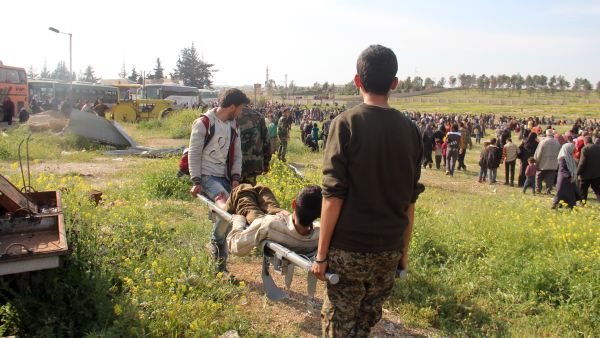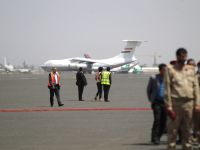At least 43 people were killed on Saturday in a car bombing targeting a convoy of evacuees from two pro-regime villages in northern Syria, a monitoring group reported.
Dozens of others were injured in the blast near buses being used for the evacuation outside the northern city of Aleppo, the Syrian Observatory for Human Rights added.
So far, there has been no claim of responsibility for the attack.
Abdel Rahman Hassan, a spokesman of the White Helmet Civil Defence group, put the death toll at 100. He told dpa that another 55 people were injured.
Syria's state news agency SANA said that scores of civilians, mostly women and children, were killed and injured in the car bombing.
The agency said that "terrorists" – a reference to rebels - had loaded the booby-trapped car with food items for children and parked it near the evacuation buses in Aleppo's suburb of al-Rashedeen.
Photos published by SANA showed heavily damaged buses with black smoke coming out of some of them, with some bodies lying on the ground.
The operation to transfer the evacuees resumed after a brief halt, the observatory said.
Buses transporting people evacuated the day before from the rebel-besieged villages of Foua and Kefraya in Idlib in north-western Syria headed into Aleppo, which is controlled by the forces of President Bashar al-Assad.
Simultaneously, buses carrying evacuees from the government-encircled towns of Madaya and al-Zabadani near Damascus were on their way to Idlib, which is mostly controlled by the rebels, the observatory said.
SANA reported that buses carrying people from Foua and Kefraya had already begun arriving in Aleppo's Jebrin area, where the government has set up a temporary housing centre for them.
Earlier Saturday, thousands of evacuees were stranded in Aleppo due to a dispute between the government and Islamist rebels over a swap deal that came into effect on Friday, the watchdog reported.
It was not immediately clear how the dispute had been resolved.
The evacuation deal, brokered by Iran and Qatar, aims to move government opponents, mostly Sunnis, from Madaya and al-Zabadani to Idlib.
In return, government supporters - mainly Shiites - who live in Foua and Kefraya would be moved to government-held areas.
Both convoys had been stuck a few kilometres apart at bus stations in Aleppo after the al-Qaeda-linked alliance, the Levant Liberation Body, demanded the return of 100 civilians already evacuated from Foua and Kefraya and their replacement with 100 pro-government fighters, according to the observatory.
Under the deal, at least 4,000 people will be evacuated from Foua and Kefraya, where some 20,000 people are estimated to be living under a rebel siege.
Over 25,000 people are estimated to be living in Madaya and al-Zabadani, which have been under siege by government forces and allies from the Lebanese Hezbollah movement since 2015.
The Syrian opposition has described the swap deal as forced displacement and a demographic change in the war-torn country.
In February, the United Nations said around 4.7 million people live in hard-to-reach locations across the country, including more than 640,000 in besieged locations.
Syria's conflict began in 2011 with demonstrations against al-Assad's government and spiralled into a multilateral civil war that has claimed hundreds of thousands of lives and displaced about half the pre-war population of 22 million.
Khalil Hamlo and Weedah Hamzah








